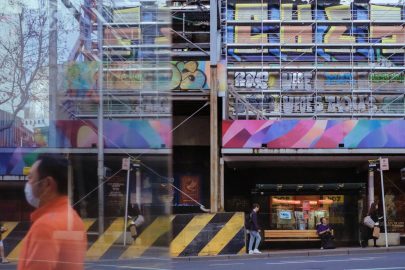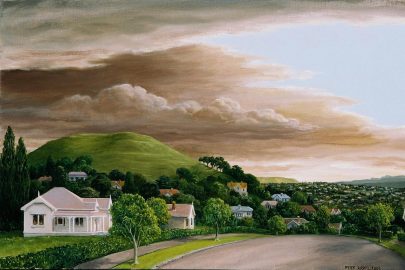Aug 14, 2014 Property
What are the secrets to buying a home at auction in the most expensive real estate market in history? First-home and second-home buyers share their stories.
Auckland’s longest-running drama is Shortland Street — 34 Shortland St, the downtown auction rooms of real estate firm Barfoot & Thompson, where troops of prospective home owners come to bid, to gamble, to pray and despair and possibly triumph.
Almost half of all property in Auckland is sold at auction. Hayden Duncan, CEO of Harcourts Real Estate, thinks it might get to 70 per cent within the next three years. Home is where the hammer is; the buyers and the vendors, the anxious and the confident, the beautiful and the lame all make their way to Barfoot’s city HQ, and await the rap of the mallet.
I made my way there in 2011 when we bought our three-bedroom home with fruit trees and a rumpus room on Te Atatu peninsula for $537,000. I recently made my way back — and to Barfoot’s auction rooms in Takapuna — to view the live action show again. It was like old times. It was humourless, stressful, crass. It was war. It was Auckland enjoying itself.
The auction room was humourless, stressful, crass. It was war. It was Auckland enjoying itself.
House prices are Auckland’s favourite conversation, its obsessive subject. It’s also Auckland’s shame — you’d think there was something better to talk about. But the demand for a house is intense, and creates the supply at auction. “Effectively,” says Helen O’Sullivan, CEO of the Real Estate Institute, “auctions are just a multi-offer sale process. And there are multiple prospective purchasers for so many properties.”
How can first-home buyers afford it? What are the prospects for second-home buyers? Do Kiwis wanting a family home stand a chance against the rumoured marauding hordes of overseas investors from Asia?
There are a million stories in the naked auction rooms. There are also some good songs. In lulls during the bidding, when agents huddled with buyers and vendors for urgent talks, music played — America’s “Horse with No Name”, Dylan’s “Mr Tambourine Man”, and Suzanne Vega’s 1987 hit song, “Luka”, that grim ballad about child abuse.
Her song had a housing angle: Luka lived on the second floor. But there was something embarrassing about listening to Vega’s exquisite sensitivities in the war room. No one wanted to hear about poor old Luka. It was a relief when the auction resumed, and everyone could return to the matter at hand: money, numbers, fear, dread, sorrow, greed, need, courage, luck and, shimmering over and above everything, possession.
First-Home Buyers
On a humid Wednesday afternoon, about 150 people, hopeful and perspiring, formed a crowd inside Barfoot’s two auction rooms on Shortland St. There were 42 lots under the hammer. The view looked out onto a pale and battered Victorian office building. Vandals had graffitied it with blue paint to create the message, EUFAT BOUGE.
In the rooms, the real estate agents came and went, staring and intent. Punters parked their bums on cheap hard chairs. One cool customer read Michael King’s Penguin History of New Zealand. An elderly Chinese woman had a sticking plaster above her top lip — it was like a parody of Hitler’s moustache. An amazing gentleman appeared in a white suit and black snakeskin boots: it was TV3 funnyman Ali Ikram, wanting to buy in Mt Eden. There were very few young couples, hardly anyone under 40.
But then I ran into one of my closest friends, Karl Puschmann, 36, sitting with his girlfriend Hayley Barnett. An auction was in progress, so I whispered, “How’s it going?” Karl gaped, and said, “What?” He looked pale and battered. I may as well have said, “EUFAT BOUGE.” He turned his head back to the front of the room. The auctioneer shouted, “Sold!” Karl said, “We just bought a house.” I said, “What?”
Karl and Hayley bought a three-bedroom unit with a deck and park views in Mt Albert for $541,000. The vendors were Janine Skelton and Libby Duff, both 40. They’d bought it at auction about 18 months ago for $410,000, and renovated. Libby said, “It’s a nice family home. We previously bought it off an elderly lady who’d raised all her family there and everything.”
They headed off for a drink. Karl had the same idea. Unsteady on his feet, unusually quiet, he staggered down the Barfoot stairs and then staggered up the stairs to Housebar at Hotel DeBrett. Along the way, we found TVNZ funnyman Tim Wilson, wanting to book DeBretts on April 8 for the launch of his latest novel, News Pigs.
The bar was small and panelled with dark wood. The barman had a shaved head. I got Asahi beer, and said, “Tell me about your day.” Karl said, “Pretty stressful. Pretty stressful.”
They had attended two auctions — one in the morning for a townhouse in Parnell, which they didn’t like as much as the property in Mt Albert, but they thought of it as “the smart one to buy, the investment”. It was passed in at $560,000.
“I was a little bit relieved… It was good to have that practice of having the heat of the room looking at you. I was conferring with Hayley; we had the whole mutter going on, the hushed tone.
‘Shall we do 520?’ And feeling the pressure the whole time. It’s pretty grim, eh. High pressure. Just the level of competitiveness you’ve got to get involved in.”
Tim arrived, and ordered a glass of water. He said, “Congratulations! What’s it like buying a house?”
Karl said, “Terrifying. I feel quite sick now.”
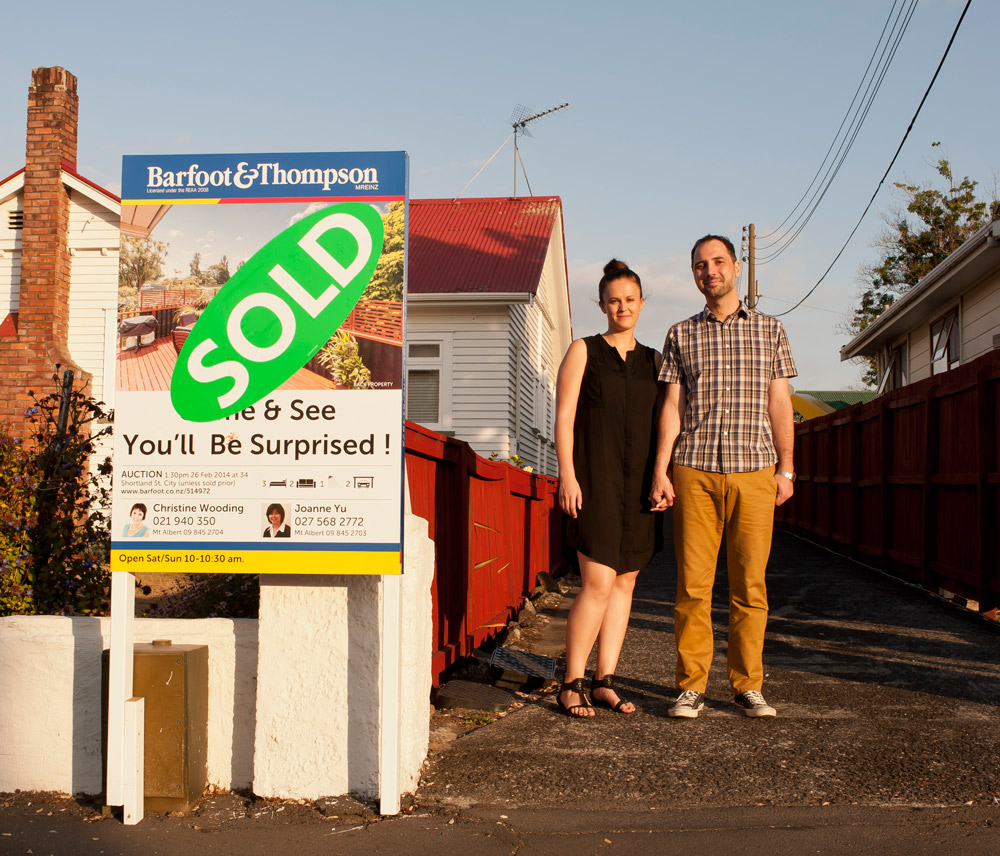
He recovered, kind of, and I said, “What do you have to do to buy your first house in Auckland in 2014?”
Look everywhere, he said. They’d gone to open homes all over Auckland, every Saturday and Sunday for months, navigating by GPS, trudging through as many as 10 homes in a day. They liked Beach Haven, and saw a great house with a pool in West Harbour going for about $550,000. But annual ferry transport to their jobs in the city from either location would have cost about $7000.
They looked at Titirangi, New Lynn, Glenfield, Ellerslie, Mt Wellington, Meadowbank, St Johns, “and we were laughed out of Te Atatu”. An agent asked what they were prepared to pay for a three-bedroom home on the peninsula. “I said, ‘580 at a push.’ She said, ‘Try 690.’”
When they saw the place in Mt Albert, they set their heart on it. Karl relived the auction that was about to change his life.
Bidding began at $400,000. “We started at 410, and then some jerk shouted out, ‘460!’ I didn’t turn around, because I get quite hateful. His voice was so irritating.”
I said, “What did it sound like?”
He said, “The voice of the devil.”
Bidding went up in increments of $10,000, until Karl and Hayley nodded for $530,000. “Selling,” the auctioneer shouted, and again: “Selling.” The hammer was poised. Karl said, “And just then a jerk in front of us, who hadn’t bid at all at any point, goes, ‘531.’ He had dreads. You don’t want to lose to a guy with dreads.
“Then the guy behind me, the devil, he goes, ‘540.’ The auctioneer was like, ‘Can you do 541?’ I turned to Hayley and she said, ‘Yep.’ The auctioneer was going, ‘Selling at 540. Do I hear 541?’ He wasn’t even looking at me and I had to hold my hand up for a while like a dickhead. Finally he sees me — and that’s when you come in and go, ‘Oh hi! How’s it going?’ And then it sold, and we had it.”
Tim listened closely, leaning forward. A newlywed, 48, he said in a strange, almost flat voice, “Well done. Wow.”
Karl said, “Yeah. It’s good. We’ll be happy in that place because it is an awesome house. We’re very happy. It just takes a while to sink in, I guess.”
Tim said, “One of the great rites of passage.”
“Felt a bit like it.”
Karl talked about how every nod of his head at the auction was worth $10,000. “It’s a heavy nod.”
Tim gave a mirthless laugh. I said, “What are you laughing at?
He said, “I’m not laughing.”
“You’re going, ‘Hahaha.’”
“No, I’m like, ‘Wow, imagine that every nod of your head is worth $10,000.’”
“Imagine it? You’re going to be doing it yourself one day.”
“I don’t want to do it.”
“You’re not going to buy a house?”
“I don’t know.”
“You’re going to be a tenant the rest of your life?”
“Sure, why not?”
“Nonsense.”
Karl said, “Just do it, man! It’s good! It’s a very good feeling. It is good.” He was still sounding exactly like he was: a man in shock.
Karl was a first-home winner; the next day, at another Barfoot auction in Shortland St, I met a seething first-home loser. Paul Smith, 30, wiry and perhaps slightly wild-eyed, felt squeezed out of Auckland’s overpriced property market. He was bitter, articulate, mad as hell.
“It’s just an unreachable goal. The prices are ridiculous.”
He said, “Where do you start? You’ve got agents underquoting the market just to get buyers in a room. Like today, the agent told me my level of interest in a house, between 400 and 450, was well worth me being there. But it passed in at 575.
“Most of the people I know who were born in the central suburbs — Epsom, Sandringham, Balmoral — they’ve got no hope of raising their kids there. And not through lack of income, either. They’re working good corporate jobs, earning early six-figures, late five-figures.
“It’s just an unreachable goal. The prices are ridiculous. You know, when you’re looking at spending 50 per cent or more of your income in debt service, and the cost of food and cost of living is through the roof, how do you survive? How do you have any expendable income?
“You become at the mercy of your mortgage unless you have another source of income or you’re working two jobs, 40 hours a week, and you’re working to pay other people to raise your kids for you. That’s not the New Zealand dream, and never was.
“I don’t want to be a prisoner to the cost of my accommodation, especially when there’s no light at the end of the tunnel and never will be…”
We had got to the end of our glasses, and I said to Karl, “Another round?”
He said, “Yes. Definitely.”
He was slowly coming round. His advice to first-home buyers: save hard, make sacrifices. I asked what sort of money they’d managed to hoard, and he said, “We had $30,000 in a year. Less than a year. About eight, nine months.
“We cut back on pretty much everything. After the initial hardship, and the shock of it, it was actually quite easy to do. Instead of buying coffee, you have the crappy coffee at work. Just little shit like that really makes a difference. We were saving a thousand a week.
“We had $75 a week spending money each. It did my head in trying to work it out. I can’t do maths at all. It was learning Excel formulas and getting columns to add up… Every dollar was accounted for.”
The colour was returning to Karl’s face. We sat in contented silence for a while in the small, quiet upstairs bar with our drinks, and then he made a speech.
“It’s good. It is good. I still remember we went out to Devonport one Saturday. We walked along and we went and had like this big breakfast at one of the cafes. It was a nice day and we were just talking about everything. You know, our future. And Hayley said, ‘We should start thinking about buying a house.’
“I was like, ‘I’ve got no money.’ She was like, ‘I’ve got no money too. Let’s start saving.’ That little thing kicked off the whole thing. And that was 10 months ago. And now we’re at the end of that conversation, with the house, and done. That’s pretty cool.”
10 Secrets of Success: The experts’ strategies for buying a house at auction
Vendors
Paul Smith, that bitter witness, had said, “It’s not just people of my generation. I know people in their 60s who sold the family home, they’re wanting to downsize, but finding they’re having to spend close to what they’ve sold to get something much smaller, and are now renting.”
He was kind of right. I met retired couple Peter and Kathryn Spratley at Barfoot’s auction rooms in the Bruce Mason Centre in Takapuna. They were the most glamorous people there. They dressed with style and spoke beautiful English. Around them, about 60 per cent of the punters were Asian.
They were auctioning their four-bedroom North Shore home with a two-bedroom rental unit. Kathryn said, “We want to release finance because of our age and have a bit more to live on besides the super. We’re thinking of retiring in Tauranga because prices are so expensive out here.”
We were at the downstairs cafe. A waitress brought Kathryn her coffee in a takeaway cup. “Oh,” she said, “I can’t drink from cardboard.” Peter took it to the kitchen in search of an actual cup.
Kathryn said, “We went to look at some properties in the weekend for us to move into, and they were asking in the same range as what we’re asking, but they were 30 or 40 years old, and no maintenance or work had been done on them at all. One place was an ordinary house built in the late 70s. And nothing had been done. The same carpet and wallpaper, the original kitchen. I thought, ‘I’m not paying $900,000 for a property like that.’
“We don’t see the point, because ours is a home and income, too. So if we can’t replace it, we’d end up homeless. That’s what made us decide the only place we could afford to live in is Tauranga.”
Peter returned with an actual cup. “Thank you, dear,” she said.
The bidders on their house were an Asian man wanting an investment property, and a woman from Australia wanting an investment property. It passed in at $950,000.
To sell your house first, or buy your next house first? Everyone I talked to in Takapuna already owned a home; the question was paramount. “The advice now is to buy first, because market prices are rising,” said Julia Gillon, 37. “But it’s a huge risk.”
She and her husband Simon had missed out on a house at auction that day. So had Mike and Marie March, another young couple with two young children. Marie said, “In an ideal world, we’d like to sell first. But it’s nerve-racking. What if you can’t find anything?”
I asked whether they’d sell their house at auction. “Well, yes, of course,” she said. She gave me a look which strongly suggested she thought I was demented. “You just do what the market’s doing.” She added, “It’d be strange not to. Everyone else is.”
Marauding hordes of investors from Asia
Paul Smith, that raven of doom, reserved his greatest anger for the marauding hordes of overseas investors from Asia. He said, “Most of the highest bids at auctions are coming from offshore. You see it all the time — agents of foreign ethnicities talking on the phone to their clients. And there’s no restrictions on them.”
Again, he was kind of right. Approval from the Overseas Investment Office is required only when foreign buyers are interested in a deal worth more than $100 million, when the property is larger than five hectares, or when it has special conservation values.
Paul said, “I’ve heard a horror story of a gentleman from China spending a significant amount of money buying 17 houses over the space of three months. That’s 17 houses taken out of the market by somebody who has no interest in residing in them, borrowing money in a market we can’t compete with because they’re borrowing at three per cent, and manipulating our open market — it’s madness.”
What if it’s not true?
“Even if it’s half-true,” he said, “that’s still eight, nine houses. We’ve still got a number of people here who buy property purely to get themselves residency. For us, it’s a major loss.”
Yes, said Helen O’Sullivan from the Real Estate Institute, she’s heard stories too. “There’s a lot of noise about foreign buyers. But there’s no hard data in the residential market as to what proportion of properties are held by non-New Zealanders. It’s entirely anecdotal… I think a lot of it’s the product of xenophobia, frankly.”
Hayden Duncan at Harcourts said, “There’s no evidence to support the claims that Asian investors are buying up large. Just because an agent is on the phone doesn’t mean they’re dealing with someone offshore — it’s just they’re simply not in the room.”
In any case, he said, New Zealand needed foreign investment. “We’d be a sad little country if we took it away.”
“Asian buyers give you a big smile, you give them a big smile back, you ask them for more money and they give it to you.”
Perhaps we already were a sad little country. In 2012, Ian Thornhill of Barfoot & Thompson told the Herald he was deeply concerned about foreign investors, principally from China: “I don’t think it’s a good thing at all. Kiwis are getting really upset. They can’t compete with Asians who have the money and they pay more… It’s as plain as the nose on your face, what’s happening in the auction rooms each week.”
I asked Campbell Dunoon, auction manager at Barfoots, whether Asian buyers had changed the dynamic of the property market. “I wouldn’t want to be quoted on this,” he said, “but, I love them! I really do.”
I said, “That’s a very positive thing to say. You should be quoted saying that!”
He said, “Okay! They are great. They really are. They are easy to deal with; they understand the auction process; I think they favour the process. No, I’m a real big fan of them. I hope I’ve conveyed that. They give you a big smile, you give them a big smile back, you ask them for more money and they give it to you.”
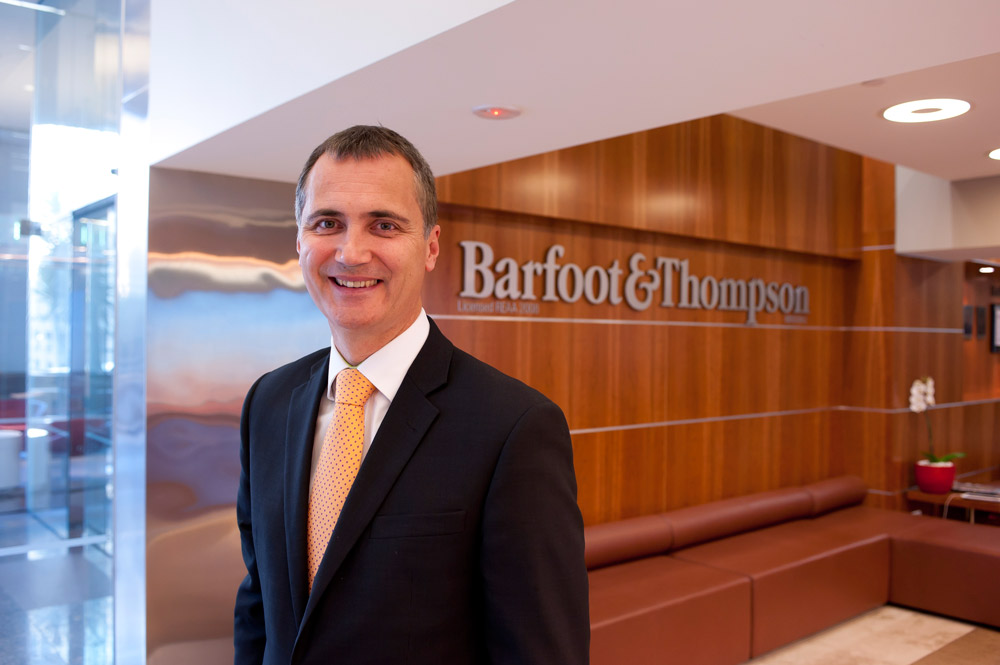
Second-home buyers
Jo Hodge, a small, lively 37-year-old, had an eventful time of it getting to the Shortland St auction rooms on that humid Wednesday to bid, to gamble, to possess. The auction started at 1.30pm. The house she was after, in Ponsonby, was eighth on the list.
She said, “I didn’t want to wait around getting nervous, so I didn’t leave work till about quarter past 1. But then I couldn’t find a park, and was beginning to get anxious. Finally I found a parking building up the road and it had one parking space left.
“I raced down to the pay machine and it didn’t take coins. I couldn’t make it work on my phone, and there wasn’t enough money on my credit card. I’m on the phone to my bank, going, ‘Move some money to my credit card, I need to go to an auction!’ I took the high heels off and raced down there. I was a wreck when I arrived.”
“We had a $1.1 million to spend on our house, and we couldn’t make it happen.”
Bidding was slow: she got there and only the third house on the list was being auctioned. “I sat down with my little cup of water and imagined what it was going to feel like when the auctioneer lady put the hammer down and I was the winner. I shouldn’t say the winner. It’s the purchaser.”
But she meant winner. There was a lot riding on that auction. Jo and her husband Drew, who have two young children, sold their house in Grafton in November. They were able to move temporarily into a family home in Henderson, and started attending open homes every Saturday and Sunday. November, December, January, February… There was one place, in Balmoral, where they had to queue just to get in the front door.
They were stressed, anxious. “It was horrible. Our budget was $1.1 million. It sounds like a lot of money. You think you’d be able to find something. But we were constantly going to all of these properties, and seeing do-ups that went for $1.2 million. It just felt hopeless. It felt completely out of reach. It was just so infuriating. We had a huge-sounding amount of money to spend on our house, and we couldn’t make it happen.”
The pressure was on, too, to get their daughter into a school they liked after she turned five on February 21. ”So, we didn’t want her to miss out on school, and our cut-off date was March 12. That’s when we’d rent in Mt Eden or somewhere like that just to get her into a good school.”
Jo’s advice: look everywhere, but limit the open homes to three a day, four at most, for your mental health. “Initially we had a list of things we wanted — it had to have a separate laundry, a garage and so on. But you have to be willing to compromise. In the end we decided that if the school had a good ERO report, and a fairly good decile rating — which I know you’re not meant to judge things, but we did — then we’d look at a house.
“I remember we saw a beautiful property in Ellerslie. Just gorgeous. Well under our budget. Two levels, loads of space, a garden with a treehouse — it was like move in, happy. We were absolutely gangbusters for it. But the school zone was not ideal.”
They bid for a house in Greenlane (selling price: $1.25 million) and another in Mt Eden ($1.28 million). “I left that one crying. I was like, ‘We’ll never buy a bloody house.’”
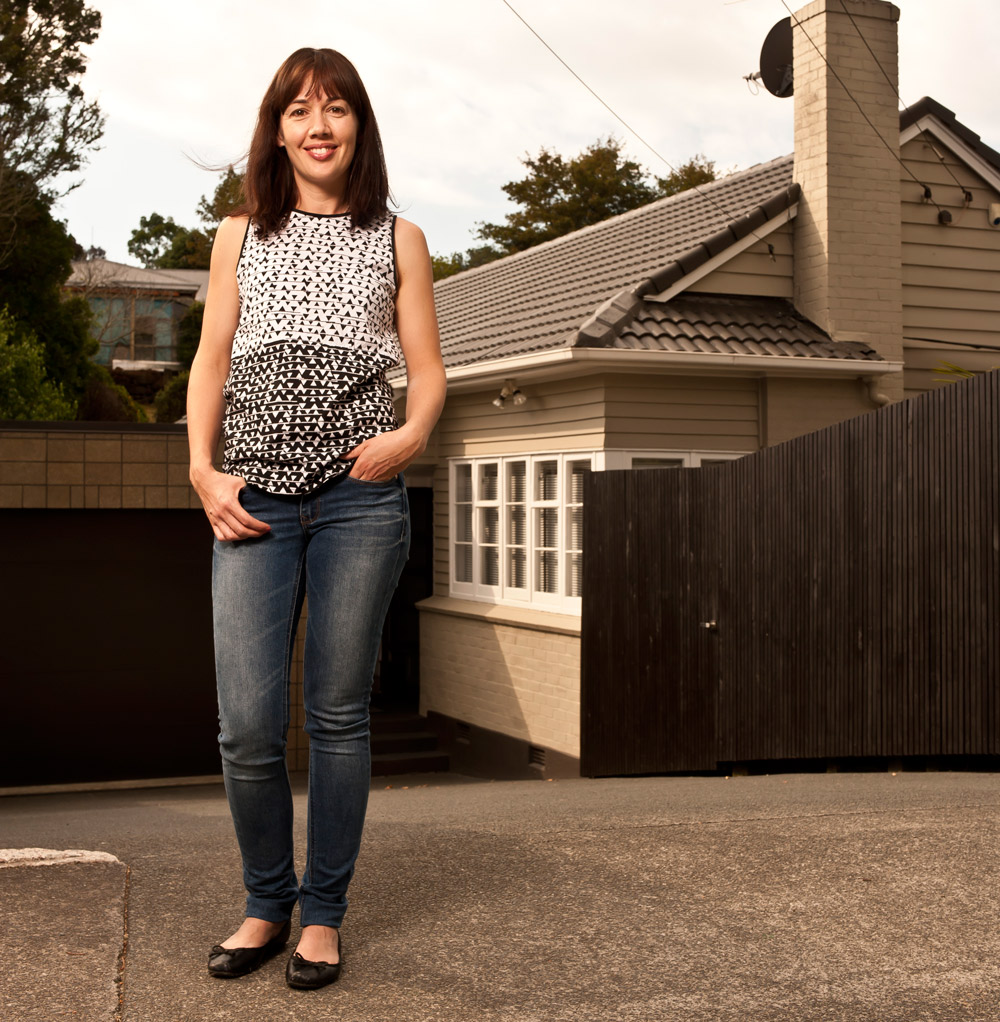
Then they saw the place they really liked in Ponsonby — it was in the school zone for Bayfield Primary, “which is decile 10 and has a great ERO report”. On the day of the auction, they decided Drew would stay at work. “He was finding it too stressful. He said, ‘If an investor buys that property I’m likely to hurt them. It’s funny looking back on it but at the time I was like, ‘You’re probably right. You might actually hurt someone.’”
In the past, she’d told colleagues at work when she went to an auction. Not this time. “I hadn’t even shown pictures of it to my mum. We just kept it completely on the down-low. We had to, for our mental health. People are so interested in whether or not you get a place, and you’re constantly telling them, ‘No, didn’t get it.’ So we kept the energy to ourselves rather than sharing it with all these other people.”
Another change was that she ignored agents’ advice to stand at the back of the room and keep an eye on other bidders — that old saw. This time, Jo sat right down at the front. “I was like, ‘Okay. This is between you and me, auction lady.’”
The bidding opened at $900,000. It went up in $20,000 increments. “One auction I went to started at 900 and the next bid was a million.” Her heart was racing, the adrenaline was flowing. She was bidding against a young couple.
At $1,040,000, they asked for the bidding to increase only by $10,000 and Jo knew she had them: “I figured they were coming to the end of their limit. I was able to calm down at that stage. I’d done the same thing as them at other auctions, because I didn’t have much left.”
The couple eventually dropped out at $1,070,000. But the house still wasn’t selling. The agent took instructions from the vendor. “The auctioneer came back and said, ‘Look, it’s not on the market yet. Can you increase the offer?’ I said, ‘Yes.’ They came back and said, ‘It’s still not at the reserve, but if you go another 10…’ I said, ‘Yes.’”
She got it for $1.1m — their absolute limit. She was ecstatic. They moved in two weeks later. Their daughter is enrolled at Bayfield.
I said, “It’s a very happy ending.”
She said, “It is. Thank God.”
Also on metromag.co.nz:
10 Secrets of Success: The experts’ strategies for buying a house at auction
The desperate quest: how Auckland’s property market drove me to the edge of insanity

